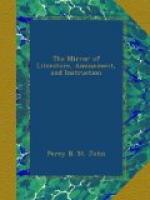Within these few years, through a sort of barbarous disregard for their associations, the lodge and the greater part of the wall represented in our engraving, has been pulled down! and the moated house has lately shared the same fate—for the sake of their materials—cupidity in which we rejoiced to hear the destroyers were disappointed—their intrinsic worth not being equal to the labour of removing them: the work of destruction would, however, have extended to the whole of the ruins had not some guardian hand interfered. It will be seen that the moated house was furnished with a ponderous drawbridge and other fortifying resources; from the licentious character of its founders it was consequently haunted many years before its removal.
In East Grinstead we learned that the Comptons were a noble family, and traditions of their hospitality are current amongst the oldest inhabitants of that town.[1]
[1] For the loan of the drawing
(made in 1780), whence the first
engraving
is copied, we are indebted to the kindness of a
gentleman
of East Grinstead; and for the sketch of the latter
to
an affectionate relative.
* * * * *
BATTLE HYMN.
Imitated from the German of Theodore Korner.[2]
(For the Mirror.)
Father, in mercy hear
A youthful warrior’s
prayer.
Thundering cannons are roaring around
me:
Carnage and death, and destruction surround
me;
God of eternal power.
Guide me in this dread
hour!
Guide me in this dread
hour
God of eternal power!
Lead me, base Tyranny manfully braving,
Onwards to where Freedom’s
banner is waving—
To death—or
victory;
I bow to thy decree!
I bow to thy decree,
In death or victory!
’Mid the loud din of the battle’s
commotion,
When Nature smiles, or when storms rend
the ocean,
Lord of the brave and
just
In thee I’ll
put my trust!
In thee I’ll put
my trust,
Lord of the brave and




